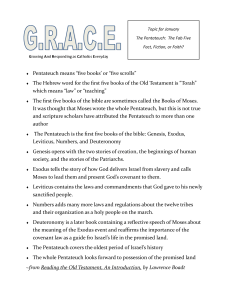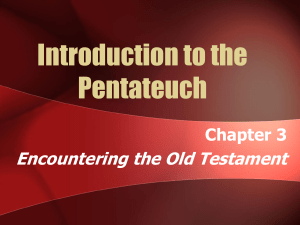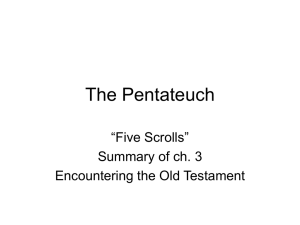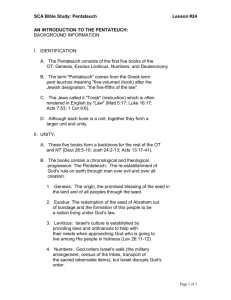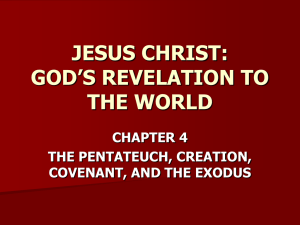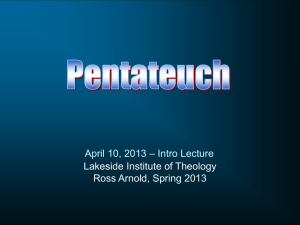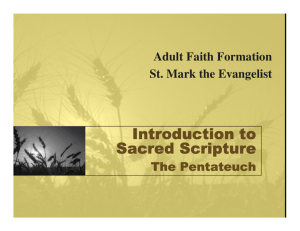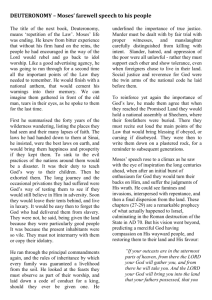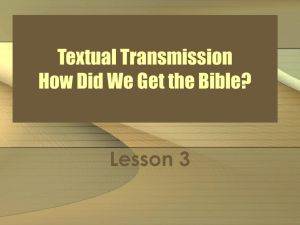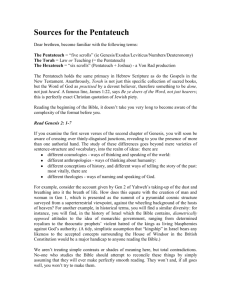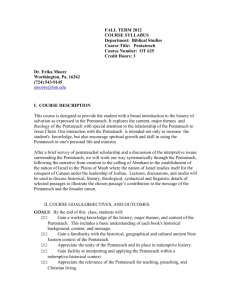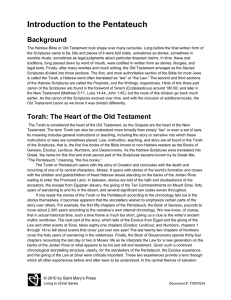Summary 2 Pentateuch - Bartley Christian Church
advertisement
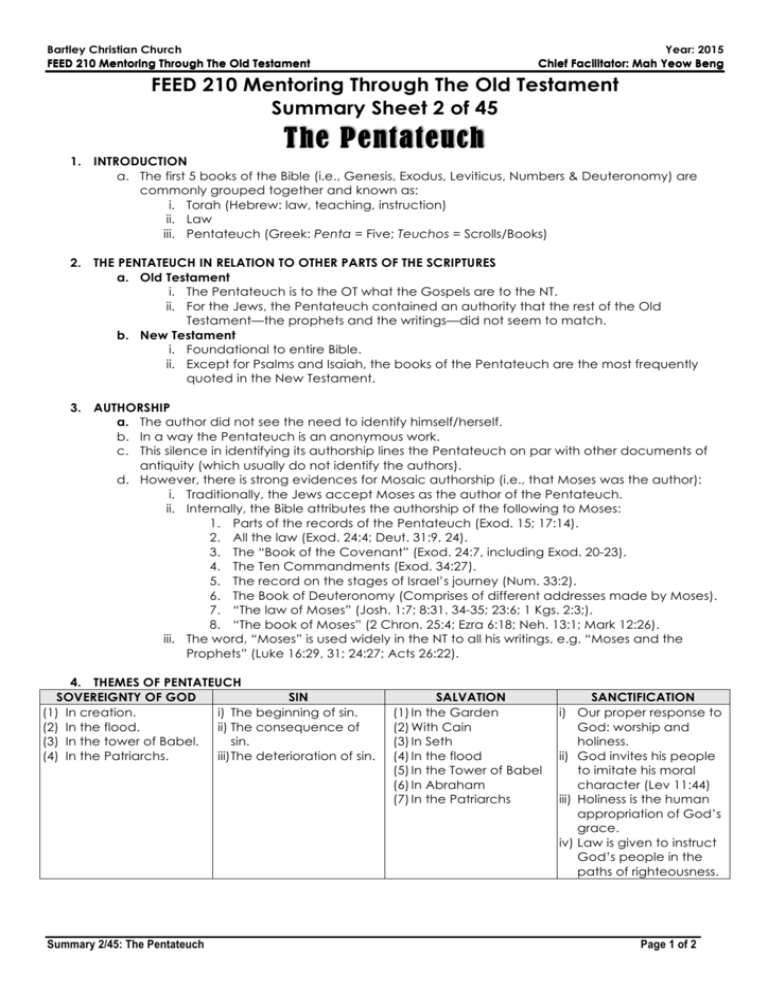
Bartley Christian Church FEED 210 Mentoring Through The Old Testament Year: 2015 Chief Facilitator: Mah Yeow Beng FEED 210 Mentoring Through The Old Testament Summary Sheet 2 of 45 The Pentateuch 1. INTRODUCTION a. The first 5 books of the Bible (i.e., Genesis, Exodus, Leviticus, Numbers & Deuteronomy) are commonly grouped together and known as: i. Torah (Hebrew: law, teaching, instruction) ii. Law iii. Pentateuch (Greek: Penta = Five; Teuchos = Scrolls/Books) 2. THE PENTATEUCH IN RELATION TO OTHER PARTS OF THE SCRIPTURES a. Old Testament i. The Pentateuch is to the OT what the Gospels are to the NT. ii. For the Jews, the Pentateuch contained an authority that the rest of the Old Testament—the prophets and the writings—did not seem to match. b. New Testament i. Foundational to entire Bible. ii. Except for Psalms and Isaiah, the books of the Pentateuch are the most frequently quoted in the New Testament. 3. AUTHORSHIP a. The author did not see the need to identify himself/herself. b. In a way the Pentateuch is an anonymous work. c. This silence in identifying its authorship lines the Pentateuch on par with other documents of antiquity (which usually do not identify the authors). d. However, there is strong evidences for Mosaic authorship (i.e., that Moses was the author): i. Traditionally, the Jews accept Moses as the author of the Pentateuch. ii. Internally, the Bible attributes the authorship of the following to Moses: 1. Parts of the records of the Pentateuch (Exod. 15; 17:14). 2. All the law (Exod. 24:4; Deut. 31:9, 24). 3. The “Book of the Covenant” (Exod. 24:7, including Exod. 20-23). 4. The Ten Commandments (Exod. 34:27). 5. The record on the stages of Israel’s journey (Num. 33:2). 6. The Book of Deuteronomy (Comprises of different addresses made by Moses). 7. “The law of Moses” (Josh. 1:7; 8:31. 34-35; 23:6; 1 Kgs. 2:3;). 8. “The book of Moses” (2 Chron. 25:4; Ezra 6:18; Neh. 13:1; Mark 12:26). iii. The word, “Moses” is used widely in the NT to all his writings, e.g. “Moses and the Prophets” (Luke 16:29, 31; 24:27; Acts 26:22). 4. THEMES OF PENTATEUCH SOVEREIGNTY OF GOD SIN (1) In creation. i) The beginning of sin. (2) In the flood. ii) The consequence of (3) In the tower of Babel. sin. (4) In the Patriarchs. iii) The deterioration of sin. Summary 2/45: The Pentateuch SALVATION (1) In the Garden (2) With Cain (3) In Seth (4) In the flood (5) In the Tower of Babel (6) In Abraham (7) In the Patriarchs SANCTIFICATION i) Our proper response to God: worship and holiness. ii) God invites his people to imitate his moral character (Lev 11:44) iii) Holiness is the human appropriation of God’s grace. iv) Law is given to instruct God’s people in the paths of righteousness. Page 1 of 2 Bartley Christian Church FEED 210 Mentoring Through The Old Testament Year: 2015 Chief Facilitator: Mah Yeow Beng 5. THE BOOKS OF THE PENTATEUCH Origin of English title from the Greek Septuagint Hebrew Titles (According to the opening Hebrew words) Synopsis GENESIS Geneseos: “beginning” or “generations” (Gen. 2:4; 5:1; 6:9; 10:31, 32; 11:10, 27; 25:12, 13, 19; 36:1, 9; 37:2) Bereshith: "In the beginning" (Gen. 1:1) The beginnings of the world and of the Hebrew people. EXODUS LEVITICUS NUMBERS Arithmoi: “numbers”—the two numbering or taking census of Israelites in the desert (Num. 1 and 26). Exodos: “exit” or “departure” (Exod. 19:1) Leuitikon: “pertaining to the Levites”—it deals with the responsibilities of the Levite priests. We'elleh Shemoth: "And these are the names" (Exod. 1:1)—links Exodus with Genesis 46:8. Wayyiqra': "And he called" (Lev. 1:1)—refers to the Lord calling Moses from the Tabernacle. Wayyedabber: "And he spoke" (Num. 1:1) Departure from Egypt under Moses Legal rulings concerning sacrifice, purification, and so forth of concern to the priests, who came from the tribe of Levi. Israel wandering in the desert for 40 years with 2 numbering for 2 generations. DEUTERONOMY Deuteronomion touto: “this second law”—a mistranslation of “a copy of this law” (Deut. 17:18). Elleh Haddebarim: "These are the words" (Deut. 1:1)—the literal parting words of Moses to the new generation. It means "second law," because many laws found in the previous books are repeated here. 6. SUMMARY OF THE PENTATEUCH HARAN EDEN? KADESH BARNEA 2. EXODUS Egypt to Sinai (430 years) 1. GENESIS Eden to Egypt (over 2,000 years) CANAAN MOAB 5. DEUTERONOMY Moab (1-2 months) EGYPT SINAI UR 4. NUMBERS Mt. Sinai to Moab (38 years) 3. LEVITICUS Mt. Sinai (1 year) Summary 2/45: The Pentateuch Page 2 of 2
